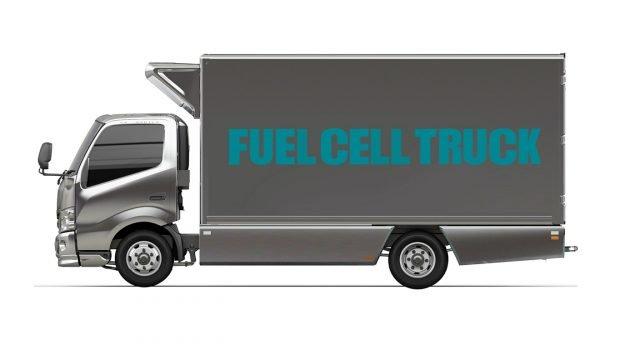Toyota Bergabung dengan Hino untuk Membangunkan Trak Elektrik Bahan Bakar Sel
Toyota dan Hino telah mengumumkan rancangan untuk bersama-sama mengembangkan trak elektrik sel bahan api ringan, fuel cell electric trucks (FCET). Ujian perintis trak ini, yang akan memiliki jarak cruising 400 km dan muatan maksimum 3 tan, akan dilakukan oleh Seven-Eleven, FamilyMart dan Lawson di Jepun mulai tahun depan.
Berikutan percubaan awal, tiga rantaian kedai akan menilai apakah percubaan selanjutnya dapat dilaksanakan pada tahun 2022 dan seterusnya. Sekiranya syarikat memutuskan untuk meneruskannya, mereka akan berusaha untuk mengenal pasti pelbagai masalah mengenai lokasi stesen hidrogen, bekalan hidrogen, kemampuan mengisi, waktu operasi, serta pembelian kenderaan dan pembiayaan bahan bakar hidrogen.
Mereka juga akan bekerjasama dengan pihak berkuasa nasional dan lokal, dan pengendali stesen hidrogen untuk mengatasi masalah ini dan membangun lingkungan yang dapat mendorong penggunaan kenderaan bahan bakar sel, tidak hanya trak ringan, tetapi juga kenderaan komersial dan penumpang.
Ini bukan kali pertama Toyota dan Hino bergabung untuk mengembangkan trak sel bahan bakar hidrogen. Pada bulan Mac tahun ini, kedua-dua syarikat itu mengumumkan bahawa mereka akan membuat sebuah trak tugas berat 25 tan yang dikuasakan oleh bahan bakar sel hidrogen yang mempunyai jarak jalan raya / bandar gabungan 600 km.

SIARAN MEDIA
Toyota Motor Corporation (Toyota) and Hino Motors, Ltd. (Hino), together with Seven-Eleven Japan Co., Ltd. (Seven-Eleven), FamilyMart Co., Ltd. (FamilyMart), and Lawson, Inc. (Lawson), have agreed to jointly consider introducing light-duty fuel cell electric trucks (light-duty FCETs), and to establish an environment for its widespread use in the future, targeting the realization of a sustainable society that takes into account global warming and energy diversification.
The main points of the agreement are as follows
- In 2021, Seven-Eleven, FamilyMart, and Lawson will conduct a trial operation of light-duty FCETs (max. payload: 3 tons) jointly developed by Toyota and Hino, to verify its practicality and convenience as part of considerations for its roll out.
- In the evaluation of the trial operations, Seven-Eleven, FamilyMart, and Lawson will verify delivery by light-duty FCETs in logistics between multiple distribution centers and stores, to see whether or not continued trials are viable in 2022 and beyond, from the perspectives of businesses and the society.
- Following this, in 2022 and beyond, they will work to identify various issues relating to convenience, such as positioning of hydrogen stations, hydrogen supply, filling capability, and operating hours, in their actual use in the market, as well as the purchase of vehicles and cost of hydrogen fuel, toward future popularization.
- The parties will propose improvements in addressing these issues, and collaborate with the national and local authorities, and hydrogen station operators, to advance discussions on the necessary support and cooperative systems required to build effective mechanisms that lead to reduced CO2 emissions through the future widespread introduction of FCETs.
Truck operations underpin the daily logistics of convenience stores that support people’s daily lives. In particular, delivery trucks that distribute products such as pre-packed meals handle multiple delivery operations in one day, and are required to drive long distances over extended hours. Fuel cell vehicles that run on hydrogen, which has a higher energy density, are considered effective under such operating conditions that require them to have sufficient cruising range and load capacity as well as fast refueling capability. The cruising range for light-duty FCETs developed by Toyota and Hino will be set at approximately 400 km, aiming to meet high standards in both environmental performance and transport efficiency expected as a commercial vehicle.
To achieve growth in demand for hydrogen, hopes are held for the introduction of fuel cell commercial vehicles, such as trucks and buses, that use more hydrogen compared with passenger vehicles. With commercial vehicles, depending upon their intended use, it is also possible to know the driving range and to plan operations systematically, including handling of refueling with hydrogen. But issues still remain for their full-scale introduction, including reduction of vehicle price and the cost of hydrogen, and improvement of the convenience of hydrogen stations.
Given this situation, the five companies are making efforts to promote the establishment of an environment for the popularization of fuel cell vehicles, not only of light-duty trucks, but also of commercial and passenger vehicles. They also aim to collaborate with the national and local authorities, and hydrogen station operators, investigating various measures through the operation of light-duty FCETs in logistics settings, in order to tackle improvements and to resolve issues.






No Comment